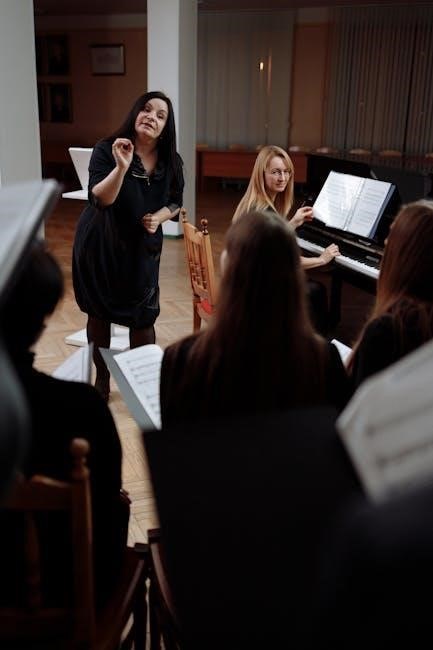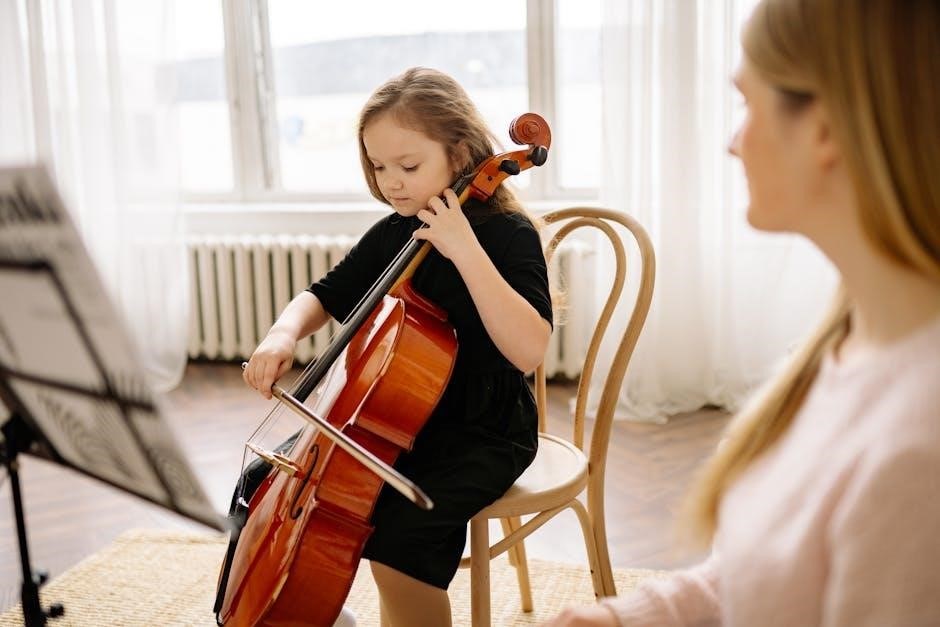Musical instructions in crosswords often involve terms like fortissimo, which means “very loud” in music․ These clues blend musical knowledge with wordplay, challenging solvers to connect musical terminology to crossword answers․
1․1 Understanding Crossword Clues Related to Music
Crossword clues related to music often involve terms like fortissimo, which means “very loud․” These clues require solvers to connect musical terminology with wordplay․ Clues may reference dynamics, such as forte (F) or mezzo-forte (mf), to indicate loudness․ They might also use synonyms or abbreviations, making them challenging․ For example, “Musical instruction to play very loud” (10 letters) often points to fortissimo․ Such clues blend musical knowledge with crossword-solving skills, appealing to both music enthusiasts and puzzle lovers․
1․2 The Role of Dynamics in Musical Crossword Clues
Dynamics, which indicate loudness or softness in music, are frequently featured in crossword clues․ Terms like fortissimo (ff) and forte (F) are commonly used to signify “very loud․” These terms often appear in clues such as “Musical instruction to play very loud” or “Very loud, in music․” Crossword constructors use these dynamic markings to create challenging yet solvable clues, requiring solvers to recognize and connect musical terminology with the appropriate Italian terms․ This integration of musical dynamics enhances the diversity and complexity of crossword puzzles, making them engaging for a wide audience․

The Meaning of “Very Loud” in Music
In music, “very loud” is expressed by the Italian term fortissimo, often abbreviated as ff․ It directs musicians to play at the highest volume, creating a dramatic effect in performances․
2․1 Fortissimo: The Musical Term for Very Loud
Fortissimo, an Italian term abbreviated as ff, denotes playing at the highest volume․ It’s used in music notation to signal maximum intensity, often creating dramatic climaxes in orchestral pieces․ Composers employ fortissimo to evoke powerful emotions, making it a key element in musical expression․ In crosswords, fortissimo frequently appears as the answer to clues like “Very loud in music,” particularly in 10-letter puzzles, making it a recognizable and essential term for both musicians and crossword enthusiasts․
2․2 The Origin and Linguistic Background of “Fortissimo”
Fortissimo originates from Italian, combining forte (loud) and the superlative suffix -issimo, meaning “very” or “extremely․” This term has been used in music since the 17th century to indicate the highest dynamic level․ In crosswords, fortissimo often appears as the answer to clues related to loudness, such as “Very loud in music” or “Musical instruction to play very loud․” Its linguistic roots and musical significance make it a popular choice for crossword constructors seeking precise terminology․

Common Crossword Clues for “Very Loud” in Music
Musical instruction to play very loud is a popular crossword clue, often hinting at the term fortissimo․ Clues like “Very loud in music (10)” frequently appear in British quick crosswords and The Telegraph․
3․1 Examples of Crossword Clues Across Different Publications
Publications like the British quick crossword and The Telegraph feature clues such as “Musical instruction to play very loud (10)” and “Very loud, in music (10)․” The New York Times often presents clues like “Extremely loud in music (10),” while the Daily Mirror might use “Musical term for very loud (10)․” These examples highlight how the same concept is phrased differently across platforms, challenging solvers to recognize the term fortissimo in various contexts․
3․2 How Crossword Clues Vary in Different Publications
Crossword clues for “very loud” in music vary across publications, reflecting their unique styles․ The New York Times often uses sophisticated wordplay, while the Daily Mirror opts for straightforward phrasing․ The Telegraph might employ cryptic clues, and British quick crosswords frequently include direct references․ For example, “Musical instruction to play very loud (10)” in British crosswords contrasts with The New York Times’ “Extremely loud in music (10)․” These variations require solvers to adapt their strategies, making crosswords engaging and diverse in their approach to the same musical term, fortissimo․

The Significance of Fortissimo in Music
Fortissimo, meaning “very loud,” is crucial for conveying dramatic intensity and emotional peaks in music, often used by composers to highlight climactic or powerful moments in both instrumental and vocal works․
4․1 Fortissimo in Orchestral and Ensemble Music
Fortissimo plays a pivotal role in orchestral and ensemble music, often signaling climactic moments or dramatic shifts․ It directs musicians to produce maximum volume, creating a powerful impact․ In orchestras, fortissimo highlights brass and percussion sections, adding intensity to compositions․ Similarly, in ensembles, it emphasizes collective energy, ensuring a unified, bold sound․ Composers use fortissimo strategically to evoke emotion, making it a cornerstone of dynamic expression in large-scale musical works․ This instruction is essential for achieving the desired auditory effect in complex, layered performances․
4․2 Fortissimo in Vocal and Choral Music
Fortissimo is frequently used in vocal and choral music to convey intense emotion or dramatic emphasis․ In choral pieces, it unites the ensemble, creating a powerful, resonant sound that fills the performance space; For solo vocalists, fortissimo highlights key moments, showcasing vocal range and strength․ Conductors often employ this dynamic to enhance textual expression, ensuring lyrics are impactful and engaging․ The careful use of fortissimo in vocal music balances technical precision with emotional depth, making it a vital element in both sacred and secular choral works․ Its application elevates the overall musical experience․
Related Musical Terms Indicating Loudness
Terms like forte (F) and mezzo-forte (Mf) indicate varying degrees of loudness, with fortissimo being the most extreme․ These terms guide musicians to adjust volume effectively in performances․
5․1 Forte (F): A Loud but Not Extreme Dynamic
Forte (F) is a musical term indicating a loud but not extreme dynamic․ It is less intense than fortissimo (Ff) but louder than mezzo-forte (Mf)․ Musicians use it to denote sections that require a strong, bold sound without reaching the maximum volume․ In crosswords, clues like “Loud in music” or “Musical loudness” often point to forte․ Its abbreviation, “F,” is commonly used in scores to guide performers․ This term is essential for understanding musical dynamics and appears frequently in crossword puzzles as a concise answer for loudness-related clues․
5․2 Mezzo-Forte (Mf): A Moderate-Loud Dynamic
Mezzo-forte (Mf) is a musical term indicating a moderate-loud dynamic, blending “mezzo” (moderate) and “forte” (loud)․ It is softer than forte (F) but louder than piano (P)․ Musicians use Mf to create a balanced sound, neither too intense nor too subdued․ In crosswords, clues like “Moderately loud in music” or “Musical dynamic between piano and forte” may point to mezzo-forte․ This term is less common in crossword clues compared to forte or fortissimo, but it appears in puzzles focusing on musical nuances․

The Structure of Crossword Clues for Musical Instructions
Crossword clues for musical instructions often involve wordplay and abbreviations, challenging solvers to decode terms like fortissimo using creative hints and musical knowledge․
6․1 Wordplay and Synonyms in Crossword Clues
Crossword clues for musical instructions often employ wordplay and synonyms to hint at terms like fortissimo, which means “very loud․” Clues might subtly reference loudness through phrases like “extremely noisy in bar?” or “pound notes,” leading solvers to the correct musical term․ Synonyms for loudness, such as “blast” or “roar,” are also used to create indirect connections․ Additionally, clues may incorporate abbreviations, like “F” for forte, to add complexity․ This blend of creativity and musical knowledge makes solving these clues both challenging and engaging for crossword enthusiasts․
6․2 The Use of Abbreviations in Crossword Clues
Abbreviations are frequently used in crossword clues to represent musical instructions․ For example, fortissimo is often abbreviated as ff, while forte is shortened to f․ These abbreviations serve as concise hints, guiding solvers to the correct term․ Crossword clues might also use numerical indicators, such as “(10),” to signify the length of the answer․ This efficient use of abbreviations and symbols helps constructors create compact yet meaningful clues, making the puzzle more intricate and engaging for solvers familiar with musical terminology․

Solving Crossword Clues for Musical Instructions
Solving crossword clues for musical instructions requires recognizing patterns and abbreviations․ Terms like fortissimo (very loud) or ff often appear in clues, making prior knowledge of musical terminology invaluable for solvers․
7․1 Tips for Identifying Musical Terms in Crosswords
Identifying musical terms in crosswords requires a mix of musical knowledge and puzzle-solving skills․ Start by recognizing common terms like fortissimo (very loud) or forte (loud), which frequently appear in clues․ Pay attention to abbreviations, such as ff for fortissimo, as they often hint at the answer․ Use word lengths and context clues to narrow down possibilities․ For example, a 10-letter answer for “very loud” likely points to fortissimo․ Cross-referencing clues and using musical terminology lists can also help solvers crack tricky puzzles efficiently․
7․2 Common Mistakes When Solving Musical Crossword Clues
Solvers often confuse abbreviations with full terms, such as mistaking ff for fortissimo․ Another mistake is overlooking the context of the clue, like assuming “loud” refers to volume without considering musical dynamics; Additionally, some might mix up similar-sounding terms, like confusing fortissimo with forte․ Overcomplicating clues or ignoring common crossword wordplay can also lead to errors․ Being aware of these pitfalls helps solvers approach musical crossword clues more systematically and accurately․
Examples of Crossword Clues and Solutions
For example, the clue “Musical instruction to play very loud” (10 letters) often leads to the solution fortissimo․ Similarly, “Very loud, in music” (10 letters) also points to fortissimo, commonly used in crosswords like the British quick crossword or The Times Concise․
8․1 “Musical Instruction to Play Very Loud” (10 Letters)
The crossword clue “Musical instruction to play very loud” (10 letters) is a popular puzzle question․ The most common solution to this clue is fortissimo, an Italian musical term meaning “very loud․” This instruction is often abbreviated as f in musical notation and is frequently used in orchestral and choral pieces to indicate a dramatic increase in volume․ Crossword enthusiasts may encounter this clue in various publications, such as the British quick crossword or The Times Concise, where fortissimo is a recurring answer due to its specificity and uniqueness in the realm of musical dynamics․
8․2 “Very Loud, in Music” (10 Letters)
The crossword clue “Very loud, in music” (10 letters) often points to the Italian term fortissimo, meaning “extremely loud․” This musical instruction is commonly abbreviated as ff in notation and is used to direct musicians to play with maximum intensity․ While fortissimo is the most frequent answer, other possibilities like stentorian (meaning very loud) or allargando (slowly getting louder) may appear in specific contexts․ This clue is popular in publications like The New York Times and The Telegraph, challenging solvers to connect musical terminology with wordplay․

The Evolution of Musical Instructions in Crosswords
Musical instructions in crosswords have evolved over time, from basic terms to more complex clues, reflecting changes in musical terminology and crossword constructor creativity․
9․1 Historical Context of Musical Terms in Crosswords
Musical terms like fortissimo have been featured in crosswords for decades, adding a unique layer of challenge and cultural depth․ Historically, crossword constructors incorporated musical instructions to appeal to a broad audience, blending music theory with wordplay․ Early crosswords often used simpler clues, while modern puzzles employ more sophisticated wordplay and synonyms․ The inclusion of terms like fortissimo reflects the evolution of crosswords as a medium that celebrates both linguistic and musical knowledge, attracting solvers from diverse backgrounds․
9․2 Modern Trends in Musical Crossword Clues
Modern crosswords increasingly incorporate diverse musical terms, with clues for “very loud” often referencing fortissimo․ Constructors now use sophisticated wordplay, synonyms, and international musical terms to create engaging puzzles․ Online platforms and AI tools have streamlined clue creation, allowing for more innovative and varied challenges․ This trend reflects a growing interest in blending cultural and linguistic knowledge, making crosswords more dynamic and educational for solvers․ The inclusion of musical instructions like fortissimo adds depth, appealing to both music enthusiasts and casual crossword fans․
Understanding fortissimo as the term for “very loud” in music is key to solving crossword clues․ This blend of musical terminology and wordplay enhances puzzle-solving skills and cultural knowledge․
10․1 Summary of Musical Instructions and Crosswords
Musical instructions in crosswords, such as fortissimo, often appear as clues requiring knowledge of musical terminology․ These clues challenge solvers to recognize terms like fortissimo, which means “very loud,” blending cultural and linguistic understanding․ The correct answer, fortissimo, is an Italian term commonly used in music notation to indicate extreme loudness․ This term, with its 10 letters, fits the crossword clue perfectly, making it the most appropriate solution․ By understanding such musical instructions, solvers enhance their ability to tackle similar crossword puzzles effectively․
10․2 Final Thoughts on Solving Musical Crossword Clues
Solving crossword clues related to musical instructions, such as fortissimo, requires a blend of musical knowledge and puzzle-solving skills․ Recognizing terms like fortissimo, which means “very loud,” is key to unlocking these clues․ Crossword enthusiasts should familiarize themselves with common musical terminology, including dynamics like forte and mezzo-forte, as well as abbreviations․ Practicing with diverse crosswords and staying attentive to cultural references can significantly improve success․ Remember, understanding the linguistic roots of musical terms, such as Italian origins, can also provide valuable insights․ Happy puzzling!
